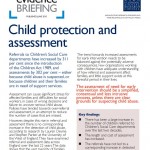Blog
Keeping you up to date on the progress of the Named Person scheme and the NO2NP campaign.
Research: ‘Increased referrals did not see equivalent rise in child abuse detection’
Posted 11 years agoA recent study into child protection strategies revealed that a rise in referrals did not result in a matching rise in detected cases of child abuse.
Researchers from Bristol Law School at the University of the West of England (UWE) said they found a “311 percent increase in referrals over the 22 years studied, but no corresponding increase in the detection of child abuse”.
A UWE press release stated: “The results raise questions about the policy towards year on year increased referrals and the resultant pressure on social workers and Children’s Services Departments to make decisions about which cases should continue onto assessment and beyond, and which should not.”
One of the researchers, Dr Lauren Devine, said: “We can see that the mixing of referrals for support services with referrals for suspected child abuse is problematic. We recommend fewer low-level assessments and wider availability of universal support services.”
The evidence briefing, entitled ‘Child protection and assessment’, stated: “Assessment can cause significant stress for affected families and difficulties for social workers, in cases of wrong decisions and failure to uncover serious child abuse.”
It continued: “Policies have tended towards over-referral and assessment, in an attempt to reduce the number of cases that are missed.”
But according to the research, the growth in referrals has not seen a similar increase in the number of child abuse cases detected.
Commenting on the figures from the 22-year study of referrals in England, the evidence briefing explained: “The data shows that the vast majority of families simply need support services – and many families do not even reach the support threshold.
“There is increased pressure on agencies to refer children, but it’s not properly recognised by professionals working with families or by policymakers that the consequences for families of the referral can be negative.”
The researchers made a number of recommendations, including: “The assessment of need for early intervention should be a simplified, consensual and less intrusive process, unless there are clear grounds for suspecting child abuse.”
Sources:
Lawyers contribute to rethinking child protection strategy
Evidence Briefing: Child protection and assessment






